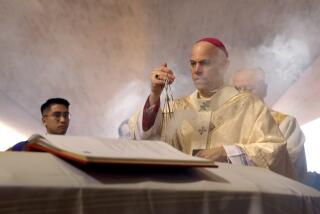Homosexuality, Gulf War, Suicide Issues Rocked Foundation of Churches in 1991 : Disunity: Five Orthodox denominations suspend activities in National Council over its liberal attitudes toward gays. Anti-Semitism re-emerges in Soviet Union.
Disputes over human sexuality rippled through religious bodies in 1991, leading even liberal denominations to wonder how far they could go in modifying traditional standards in light of contemporary practices.
The issue of homosexuality was especially divisive, turning up as a key factor in a threatened schism in the Episcopal Church and seriously undermining the ecumenical movement as Orthodox groups suspended activities in the National Council of Churches.
Debates on sexuality in many churches this year were like hot coals dropped on a raging fire. In June, the Presbyterian Church (U.S.A.) rejected a document that challenged traditional Christian standards such as prohibition of sex outside of marriage, but not before bitter divisions turned the assembly into an emotionally wrenching drama.
The General Convention of the Episcopal Church affirmed traditional standards, while acknowledging a âdiscontinuityâ between them and the experience of many contemporary members of the church. That stance failed to satisfy traditionalists.
Discontent over ordination of women and of practicing homosexuals prompted traditionalists to announce plans to establish a âmissionary dioceseâ that would bypass the authority of liberal bishops--a move that was denounced by top officials of the Episcopal Church and the worldwide Anglican Communion.
Orthodox discontent with the perceived liberal attitudes of many National Council member churches toward homosexuals was a major factor in leading five Orthodox churches to suspend council activities.
The Southern Baptist Convention, dominated by fundamentalists who have emerged victorious after a 12-year battle with moderates, reaffirmed at its convention in June what it called âthe biblical standard of sexuality.â In August, a United Methodist committee reported that it had been âunable to arrive at a common mindâ on whether homosexual practice is compatible with the Christian faith.
Early this month a study guide prepared for the Evangelical Lutheran Church in America called extramarital sex âunacceptable,â while expressing sympathy for dilemmas facing unmarried people.
Each of the divided denominations will face the issues again at national meetings in 1992 and 1993.
Despite these internal disputes, historic worldwide events in 1991 drew the attention of religious leaders outward.
The year that began with the Persian Gulf War ended with a civil war in Yugoslavia and found religious bodies taking sides in the conflicts.
The monthlong Gulf War was denounced by most mainline Protestant groups, and the U.S. Catholic bishops issued a statement challenging the war on the basis of several âjust warâ principles. Some evangelical and fundamentalist Protestants and virtually all Jewish groups supported the war.
In the Soviet Union, the disintegration of a huge nation into autonomous republics led to a resurgence of old conflicts between Catholic and Orthodox churches and signs of a re-emergence of anti-Semitism. Changes in that region raised fears of moves by the Russian Orthodox Church to establish a position of dominance.
Clashes between Orthodox and Catholics were particularly pronounced in Ukraine and in Yugoslavia, where the civil war pitted Orthodox Serbs against Catholic Croatians.
Churches were also key participants in historic changes in South Africa, where the government was seriously moving to dismantle the last vestiges of apartheid.
The coup in Haiti that removed President Jean-Bertrand Aristide, a former Catholic priest, was widely condemned by religious groups. It led to a new refugee crisis in Central America, which also saw an increase in efforts to end a decade-long civil war in El Salvador.
Issues at home that commanded attention of religious leaders included a âright-to-dieâ proposal before Washington state voters in November. Religious groups lined up on both sides of the debate, which was intensified with release this fall of âFinal Exit,â a how-to book on suicide, by Derek Humphry. The Washington proposal, which would have legalized physician-assisted suicide, was defeated at the polls.
More to Read
Sign up for Essential California
The most important California stories and recommendations in your inbox every morning.
You may occasionally receive promotional content from the Los Angeles Times.










